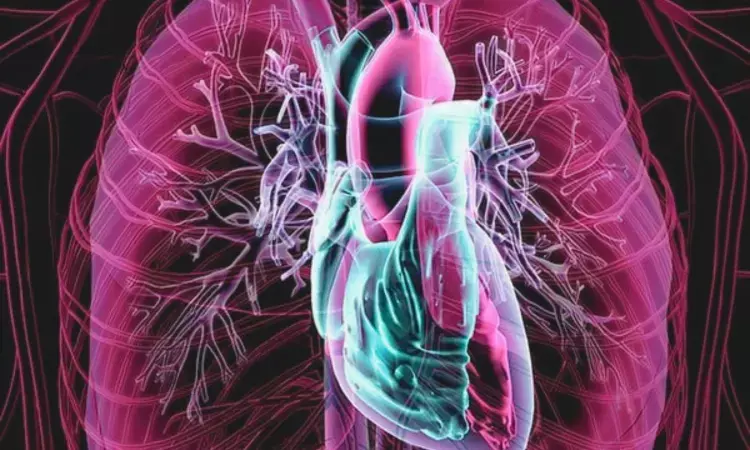- Home
- Medical news & Guidelines
- Anesthesiology
- Cardiology and CTVS
- Critical Care
- Dentistry
- Dermatology
- Diabetes and Endocrinology
- ENT
- Gastroenterology
- Medicine
- Nephrology
- Neurology
- Obstretics-Gynaecology
- Oncology
- Ophthalmology
- Orthopaedics
- Pediatrics-Neonatology
- Psychiatry
- Pulmonology
- Radiology
- Surgery
- Urology
- Laboratory Medicine
- Diet
- Nursing
- Paramedical
- Physiotherapy
- Health news
- Fact Check
- Bone Health Fact Check
- Brain Health Fact Check
- Cancer Related Fact Check
- Child Care Fact Check
- Dental and oral health fact check
- Diabetes and metabolic health fact check
- Diet and Nutrition Fact Check
- Eye and ENT Care Fact Check
- Fitness fact check
- Gut health fact check
- Heart health fact check
- Kidney health fact check
- Medical education fact check
- Men's health fact check
- Respiratory fact check
- Skin and hair care fact check
- Vaccine and Immunization fact check
- Women's health fact check
- AYUSH
- State News
- Andaman and Nicobar Islands
- Andhra Pradesh
- Arunachal Pradesh
- Assam
- Bihar
- Chandigarh
- Chattisgarh
- Dadra and Nagar Haveli
- Daman and Diu
- Delhi
- Goa
- Gujarat
- Haryana
- Himachal Pradesh
- Jammu & Kashmir
- Jharkhand
- Karnataka
- Kerala
- Ladakh
- Lakshadweep
- Madhya Pradesh
- Maharashtra
- Manipur
- Meghalaya
- Mizoram
- Nagaland
- Odisha
- Puducherry
- Punjab
- Rajasthan
- Sikkim
- Tamil Nadu
- Telangana
- Tripura
- Uttar Pradesh
- Uttrakhand
- West Bengal
- Medical Education
- Industry
Intravenous tolvaptan equally safe and effective as oral formulation in severe acute heart failure patients: Study

Japan: In a new study focusing on the management of acute decompensated heart failure (ADHF), researchers have compared the efficacy and safety of intravenous (IV) versus oral administration of tolvaptan (TLV), a selective vasopressin V2 receptor antagonist known for its diuretic effects. Published in the Journal of Cardiology, the study aimed to determine the optimal route of administration for tolvaptan during the acute phase of ADHF.
The study showed that in the acute phase of acute decompensated heart failure, IV tolvaptan is equally effective and as safe as oral TLV in real-world clinical settings. Additionally, intravenous TLV was used in more severe cases, however, may be equally effective.
ADHF, a condition characterized by sudden worsening of heart failure symptoms, often requires intensive treatment to relieve fluid retention and improve cardiac function. Tolvaptan, which works by increasing free water excretion without significantly altering electrolyte balance, has become a crucial tool in managing fluid overload in these patients. Intravenous tolvaptan is newly available, but its clinical reports are scarce.
To fill this knowledge gap, Tomoaki Okada, Department of Cardiology, Kagawa Prefectural Central Hospital, Kagawa, Japan, and colleagues aimed to investigate the efficacy and safety of intravenous versus oral tolvaptan in the acute phase of acute decompensated heart failure.
The comparative study included ADHF patients admitted to several tertiary care hospitals across the country. They were randomly assigned to receive either IV tolvaptan or oral tolvaptan within 24 hours after admission. Their safety and efficacy were analyzed during hospitalization.
The key findings were as follows:
- Efficacy: No differences were noted in total urine volume and change in body weight between the two groups.
- Safety: The incidence of hypernatremia and worsening renal function (WRF) did not differ between the groups.
The study's findings may help optimize treatment strategies for patients with ADHF, particularly in emergency and intensive care settings. By elucidating the comparative efficacy and safety profiles of IV versus oral tolvaptan, healthcare providers can make informed decisions regarding the suitable route of administration based on individual patient needs and clinical circumstances.
Reference:
Okada T, Takagi W, Miyoshi T, Oka A, Seiyama K, Ugawa S, Nosaka K, Doi M. Efficacy and safety of intravenous versus oral tolvaptan in the acute phase of acute decompensated heart failure. J Cardiol. 2024 Jun 23:S0914-5087(24)00125-4. doi: 10.1016/j.jjcc.2024.06.008. Epub ahead of print. PMID: 38917874.
Dr Kamal Kant Kohli-MBBS, DTCD- a chest specialist with more than 30 years of practice and a flair for writing clinical articles, Dr Kamal Kant Kohli joined Medical Dialogues as a Chief Editor of Medical News. Besides writing articles, as an editor, he proofreads and verifies all the medical content published on Medical Dialogues including those coming from journals, studies,medical conferences,guidelines etc. Email: drkohli@medicaldialogues.in. Contact no. 011-43720751


